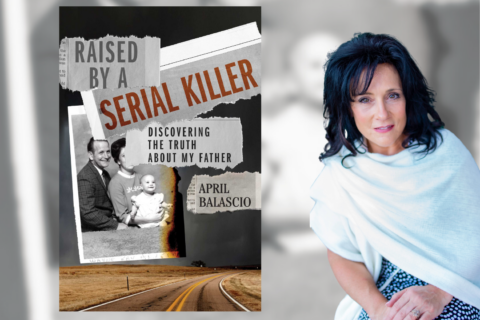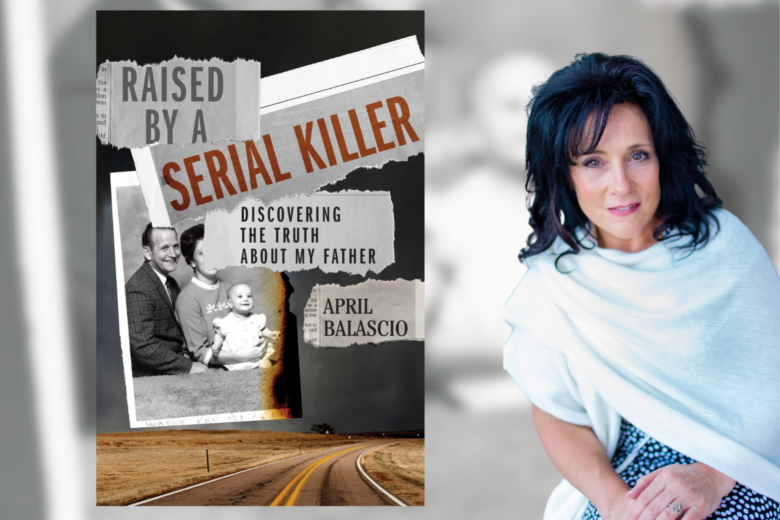WTOP Book Report: She was ‘Raised By A Serial Killer’ — and she brought him to justice
Description
Growing up, April Balascio’s life was a paradox — one filled with moments of joy underpinned by the harrowing darkness of her father, Edward Wayne Edwards, a man who would later be revealed as a serial killer.
<figure class='article_featured_image right' data-fancybox data-src='#modal-post-featured-image'>

<figcaption>April Balascio discusses her new memoir 'Raised by a Serial Killer: Discovering the Truth About My Father." (Book cover courtesy Gallery Books/Simon & Schuster, author photo by Jonathan Easterling)</figcaption>
</figure>
<figure class='article_featured_image modal'>

<figcaption>April Balascio discusses her new memoir 'Raised by a Serial Killer: Discovering the Truth About My Father." (Book cover courtesy Gallery Books/Simon & Schuster, author photo by Jonathan Easterling)</figcaption>
</figure>
In her memoir, Raised by a Serial Killer (Gallery Books), Balascio recounts her upbringing and the unimaginable journey of uncovering the truth about her father and ultimately making the call that brought him to justice.
“He was fun (and) he was charismatic on one side, but on the other side he was this horrible, despicable monster … but he was still my dad, and I still loved him,” Balascio said in an interview with WTOP for The Book Report. “There were times that my childhood was fun and great, and that was because of my dad.”
Mysterious moves and sadistic pranks
In Raised by a Serial Killer, Balascio describes a childhood marked by sudden moves, resulting in her family residing in eight different states before she was 13 years old.
Their departures would frequently coincide with violent murders occurring right before the family left town in a vehicle packed with rented or borrowed furniture and appliances, often leaving burning rental property in their wake.
Edwards, who was convicted of five murders, left a long shadow over his family. Balascio revealed that her suspicions about her father began as early as sixth grade, particularly after the 1980 murders of Tim Hack and Kelly Drew in Wisconsin, often referred to as the “Sweetheart Murders.”
“At the time we left Wisconsin, they were just missing,” she said. “Even at that young age, I realized [my father] was obsessed with the case, and it made the wheels start turning.”
<button class="wtop-audio__playToggle" role="button">
toggle audio on and off
</button>
<label for="wtop-audio__volume-e8198c32a058438a2aca87d5ca7b918b" class="accessible-text">change volume</label>
<input class="wtop-audio__volume" id="wtop-audio__volume-e8198c32a058438a2aca87d5ca7b918b" type="range" min="0" max="1" value="1" step="0.1">
April Balascio discusses her memoir 'Raised by a Serial Killer' with Terik King for the WTOP Book Report.
<script type="text/javascript">
$(function () {
$('.wtop-audio-container .fa-play').on('click', function(){
var audio_filename = $('div.wtop-audio-file').data("mp3-url");
if( typeof gtag === "function" ){
gtag('event', 'post_audio', {
'play': audio_filename,
'permalink': window.location.href
});
}
});
});
</script>
Balascio’s childhood was a mix of fun and fear; her memoir alternates idyllic recollections of riding and bonding with her own ponies on a childhood family farm in Doylestown, Ohio, with descriptions of how her father masked sadistic acts as “pranks,” including what she calls the “buttermilk incident.”
This was a post-bath ritual where he would give her the “choice” to drink a quart of cold buttermilk — which he knew she hated — or “wear it,” once he’d poured it over her freshly-shampooed head. “I can’t even imagine doing that to one of my children,” she said.
As the eldest of five, Balascio bore the brunt of her father’s abusive tendencies to protect her younger siblings. “He instilled in me that it was my responsibility to take care of them,” she explained.
Another survival tactic she adapted was not to show any indication of when she was in pain. She would stoically dissociate during beatings, and stay mum about illnesses or injuries. This learned behavior followed her into adulthood, affecting her relationships and sense of self-worth.
Confronting the past
In Raised by a Serial Killer, Balascio recounts the moment in 2007 when, after DNA evidence was gathered in the murders of Drew and Hack, she called a tip line to share her suspicions about her father.
When asked about the courage it took to turn her father in, Balascio opted to reframe the narrative: “I don’t want to say it was an act of courage. I needed to know. It was driving me crazy, not knowing for sure.” Now, she channels her pain into helping families of cold case victims linked to her father’s crimes. “I can’t even imagine being one of those parents … that’s my main motivation.”
Sharing her reasons for writing the memoir and reflecting on the trauma she endured, Balascio hopes her memoir will inspire others to break free from cycles of dysfunction. “I didn’t want to continue my father’s legacy of making bad choices.”
“No one could tell my story the way I can,” Balascio said. “I wanted my voice to be heard … sticking to the truth and nothing but the truth.”
Ultimately, she described Raised by a Serial Killer as more memoir than true crime. “It’s a story about coming from a very dysfunctional family, overcoming obstacles, and doing the right thing,” she said.
“You don’t have to be a product of your environment.”





